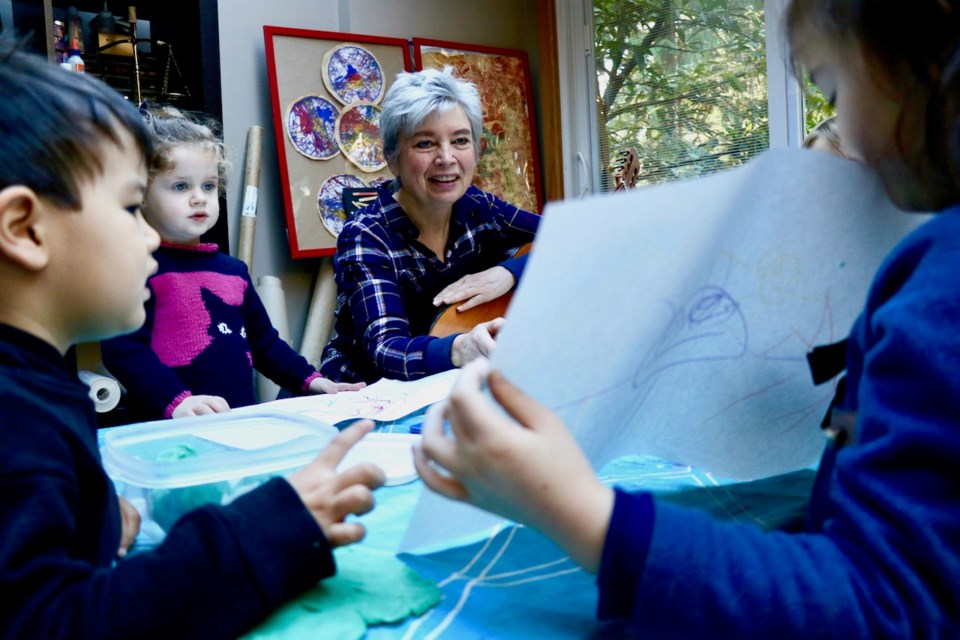A few weeks ago, Elisabeth Mueller gathered the children and parents of her daycare, Kinderhaus, and told them they’d be paying $10 a day for childcare, rather than the $50 plus they’d been paying up to that point (costs vary by age.)
Parents said it was like winning the lottery on Bowen.
“They were nearly in shock,” laughed Elisabeth.
The Bowen-based Kinderhaus is one of 53 daycares B.C.-wide selected as a prototype site for the province’s universal childcare project. This means that families are paying $10 a day for a child’s care, to a total of no more than $200 a month. The program began Nov. 1.
The pilot project was one of B.C. Premier John Horgan’s campaign promises during last year’s election. It runs until March 2020.
Elisabeth said that most of the selected daycares are larger, with only nine sole-proprietor operations part of the program, but that it’s important to support daycare diversity as different children have different needs.
“We’re showing them how small daycares work,” said Elisabeth.
“With a range of structured, semi-structured and spontaneous learning opportunities, Bowen Island Kinderhaus gives little learners the freedom they need to explore the natural world around them,” said Katrina Chen, Minister of State for Child Care in a government press release in early November. “The children learn vital social skills including communication, co-operation and patience with their peers, and are exposed to life skills such as food preparation of morning smoothies.”
More than 300 daycares underwent the thorough application process for the pilot program. Elisabeth, who applied back in July, said that the Ministry of Children and Family Development required complete transparency: how the daycares function, educational frameworks, facility profiles and financial statements – all laid bare for the government.
But Elisabeth said she saw project as an opportunity: the chance to work with the government to improve subsidized care in the province and the chance to support parents.
“I do anything to support parents,” said Elisabeth. “Because I realise how hard it is for parents on Bowen to combine work and children.”
Hilary Murfitt and her partner moved to Bowen about a year ago with their toddler Lily Max.
Max (as she’s known) started attending Kinderhaus last March. At the time, it cost $62 a day for Max to attend daycare (after Max turned three in September it became slightly cheaper.) Hilary, whose partner travels for extended periods for work, found it difficult to balance working, personal time and childcare – it was almost more economically feasible to stay at home with Max.
With $10 a day care, Hilary said that they’re saving between $400 and $500 a month, giving her the freedom to work more and have an hour or two to herself. But she said that Kinderhaus’s selection is about more than the money, it’s giving Elisabeth recognition.
“She’s really something exceptional,” said Hilary. “Not just for the kids, she looks after the parents too.”
Elisabeth holds themed parent nights where she serves tea and cookies and discusses daycare-related topics such as educational philosophies (Montessori, IB, etc.) or the importance of play. Inevitably this leads into discussion of what’s happening at Kinderhaus.
“This exchange and communication and collaboration is important for me,” said Elisabeth, who has decades of experience working with large (more than 100) and small (fewer than seven) groups of children in Canada and Germany. “I learn about the families and the child.”
It is this intimacy that allows Elisabeth to figure out what some children, who otherwise have trouble with daycare, need.
Hilary’s daughter Max had been at Bowen Childrens Centre, (which Hilary maintains is an excellent institution) but the transition to the group care setting was too much too soon for the toddler. Max didn’t embrace daycare until she went to Kinderhaus.
“She’s stoked to go there now,” said Hilary.
Elisabeth said that there aren’t enough options and opportunities for childcare in B.C., an issue that’s exacerbated by strict licence regulations.
“It scares everybody off,” she said. “They should be more flexible.”
Elisabeth’s current licence requires her to work out of her home and as a renter on Bowen this comes with its own set of troubles.
“It’s so tricky to manage,” she said.
She also notes that Bowen has a dire need for care for children under three (according to the 2016 census there were 165 children under four on the island.)
Elisabeth said that her seven daily spaces are currently full and that there is a waiting list.



